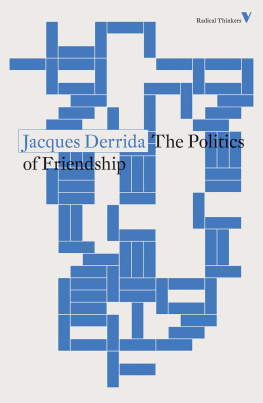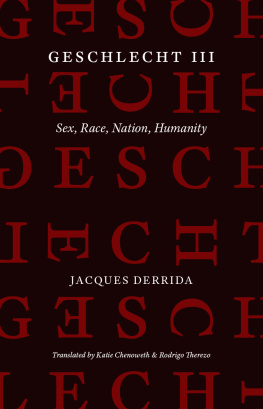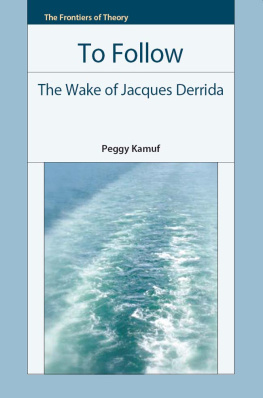Jacques Derrida - The Politics of Friendship
Here you can read online Jacques Derrida - The Politics of Friendship full text of the book (entire story) in english for free. Download pdf and epub, get meaning, cover and reviews about this ebook. publisher: Verso Books, genre: Religion. Description of the work, (preface) as well as reviews are available. Best literature library LitArk.com created for fans of good reading and offers a wide selection of genres:
Romance novel
Science fiction
Adventure
Detective
Science
History
Home and family
Prose
Art
Politics
Computer
Non-fiction
Religion
Business
Children
Humor
Choose a favorite category and find really read worthwhile books. Enjoy immersion in the world of imagination, feel the emotions of the characters or learn something new for yourself, make an fascinating discovery.
- Book:The Politics of Friendship
- Author:
- Publisher:Verso Books
- Genre:
- Rating:5 / 5
- Favourites:Add to favourites
- Your mark:
- 100
- 1
- 2
- 3
- 4
- 5
The Politics of Friendship: summary, description and annotation
We offer to read an annotation, description, summary or preface (depends on what the author of the book "The Politics of Friendship" wrote himself). If you haven't found the necessary information about the book — write in the comments, we will try to find it.
The Politics of Friendship — read online for free the complete book (whole text) full work
Below is the text of the book, divided by pages. System saving the place of the last page read, allows you to conveniently read the book "The Politics of Friendship" online for free, without having to search again every time where you left off. Put a bookmark, and you can go to the page where you finished reading at any time.
Font size:
Interval:
Bookmark:

THE POLITICS OF FRIENDSHIP
Jacques Derrida
Translated by George Collins

This book is supported by the French Ministry for Foreign Affairs as part of the
Burgess Programme, headed for the French Embassy in London by the Institut
Franais du Royaume Uni

Originally published as Politiques de lamiti by
Editions Galile, Paris 1994
Editions Galile 1994
Translation first published by Verso 1997
George Collins 1997, 2020
This edition published by Verso 2020
All rights reserved
The moral rights of the author and translator have been asserted
1 3 5 7 9 10 8 6 4 2
Verso
UK: 6 Meard Street, London W1F 0EG
USA: 20 Jay Street, Suite 1010, Brooklyn, NY 11201
www.versobooks.com
Verso is the imprint of New Left Books
ISBN-13: 978-1-78873-859-0
ISBN-13: 978-1-78960-262-3 (US EBK)
ISBN-13: 978-1-83976-305-2 (UK EBK)
British Library Cataloguing in Publication Data
A catalogue record for this book is available from the British Library
Library of Congress Cataloging-in-Publication Data
A catalog record for this book is available from the Library of Congress
Quocirca et absentes adsunt et, quod difficilius dictu est, mortui vivunt.
(Cicero, Laelius de Amicitia)
This essay resembles a lengthy preface. It would rather be the foreword to a book I would one day wish to write.
In its present form, opened by a vocative (O my friends), its form is thus that of an address hazardous, without the least assurance, at the time of what was only the first session of a seminar conducted with this title, Politics of Friendship, in 198889. The trajectory of an introduction of this sort is here quite long, certainly, but it is strictly respected throughout its argumentation, stage by stage, in its scansion, in its logical schema as well as in most of its references. Hence the explanation, if not the justification, of the inchoate form of the project: preliminary rather than problematic.
I count on preparing for future publication a series of seminar studies within which this one actually finds its place, well beyond this single opening session, which thus presupposes its premisses and its horizon. Those that immediately preceded it, then, if it is anything but useless to recall the logical development at this point, were centred on: Nationality and Philosophical Nationalism (1. Nation, Nationality, Nationalism [198384]; 2. Nomos, Logos, Topos [198485]; 3. The Theological-Political [198586]; 4. Kant, the Jew, the German [198687]); and Eating the Other (Rhetorics of Cannibalism) [198788]. Subsequent seminars concerned Questions of Responsibility through the experience of the secret and of witnessing [198993].
Be it artifice or abstraction, if I here detach one of these numerous sessions, and only the first for the moment, it is because, for apparently contingent reasons, this session gave birth to several conferences.
In the course of the academic year 198889, each session opened with these words from Montaigne, quoting a remark attributed to Aristotle: O my friends, there is no friend. Week after week, its voices, tones, modes and strategies were tried on, to see if its interpretation could then be sparked, or if the scenography could be set in motion around itself. This work, taking its time, replays, represents, only the first session. This representation thus repeats less a first act than a sort of preview. It is no doubt anything but a primal scene, although the figure of the friend, so regularly coming back on stage with the features of the brother who is critically at stake in this analysis seems spontaneously to belong to a familial, fratemalist and thus androcentric configuration of politics.
Why would the friend be like a brother? Let us dream of a friendship which goes beyond this proximity of the congeneric double, beyond parenthood, the most as well as the least natural of parenthoods, when it leaves its signature, from the outset, on the name as on a double mirror of such a couple. Let us ask ourselves what would then be the politics of such a beyond the principle of fraternity.
Would this still deserve the name polities?
The question is no doubt valid for all political regimes, but it is undoubtedly more crucial with respect to what is called democracy if, at least, one still understands by this term the name of a regime which, as is well known, will always have been problematic.
The concept of politics rarely announces itself without some sort of adherence of the State to the family, without what we will call a schematic of filiation: stock, genus or species, sex (Geschlecht), blood, birth, nature, nation autochthonal or not, tellurian or not. This is once again the abyssal question of the phsis, the question of being, the question of what appears in birth, in opening up, in nurturing or growing, in producing by being produced. Is that not life? That is how life is thought to reach recognition.
If no dialectic of the State ever breaks with what it supercedes [relve] and from which it arises [ce dont elle relve] (the life of the family and civil society), if politics never reduces within itself this adherence to familial generation, if any republican motto almost always associates fraternity with equality and freedom, as for democracy, it is rarely determined in the absence of confraternity or brotherhood.
Literally or through a figure, but why this figure?
Democracy has seldom represented itself without the possibility of at least that which always resembles if one is willing to nudge the accent of this word the possibility of a fraternization. The fratriarchy may include cousins and sisters but, as we will see, including may also come to mean neutralizing. Including may dictate forgetting, for example, with the best of all intentions, that the sister will never provide a docile example for the concept of fraternity. This is why the concept must be rendered docile, and there we have the whole of political education. What happens when, in taking up the case of the sister, the woman is made a sister? And a sister a case of the brother? This could be one of our most insistent questions, even if, having done so too often elsewhere, we will here avoid convoking Antigone, here again the long line of historys Antigones, docile or not, to this history of brothers that has been told to us for thousands of years.
As we know, what still links democratization, perhaps more today than ever before, to fraternization cannot always necessarily be reduced to patriarchy in which the brothers begin by dreaming of its demise. Patriarchy never stops beginning with this dream. This demise continues endlessly to haunt its principle.
At the centre of the principle, always, the One does violence to itself, and guards itself against the other.
In principle, then, we should also think even though we did not mention it in the course of the sessions, even if we were not thinking it about the political crime.
We are not referring necessarily to those crimes called political crimes, those assassinations with political motivation which litter History with so many corpses. Rather a second hypothesis a thinking of
Font size:
Interval:
Bookmark:
Similar books «The Politics of Friendship»
Look at similar books to The Politics of Friendship. We have selected literature similar in name and meaning in the hope of providing readers with more options to find new, interesting, not yet read works.
Discussion, reviews of the book The Politics of Friendship and just readers' own opinions. Leave your comments, write what you think about the work, its meaning or the main characters. Specify what exactly you liked and what you didn't like, and why you think so.
















